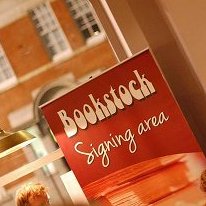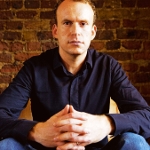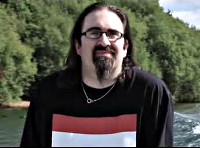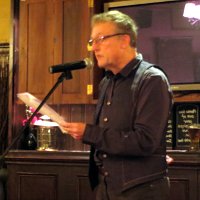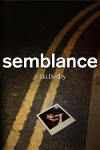 We’re thrilled we’ve a real life Australian citizen reading to us at our Aussie Christmas Party event on 28 January! What can we expect from you?
We’re thrilled we’ve a real life Australian citizen reading to us at our Aussie Christmas Party event on 28 January! What can we expect from you?
I’m only an adopted Aussie, as my wife Jenny (who is true blue) keeps reminding me. Australia Day is generally an excuse for a few tinnies and a good time and in line with that I have an allegedly funny poem to read called ‘Australian Doggerel’. I’ve been looking for someone to inflict it on for years, and you’re it! The good news is it doesn’t go on for long.
Tell us about Distant Thunder, your new novel out in March…
It’s an epic Victorian adventure. Starts in 1893 and deals with the stories of two young people.
Frank Gray has led an enchanted boyhood in British India until his mother is assaulted by a British cavalry officer: Frank commits his life to finding the man and exacting revenge.
Grace Dearborn grows up in privilege and luxury in England, daughter of the wealthy head of a trading house. She learns the cost of this wealth to ordinary people and her politics lurch towards the radical, which brings her into conflict with the father she adores.
When Frank and Grace meet, they find they have more in common than a quest for justice. But the highest hurdle they will have to overcome is the past.
How does it differ from The Warning Bell, which you read at Bookstock in November 2010?
It’s purely historical, for one thing, while The Warning Bell is modern and only had links to an historical past. Distant Thunder is also in the third person, while Bell was in the first, which allows for many more points of view. Thunder is altogether a bigger book – physically it really is quite weighty! – but it also uses a much broader canvas, moving between India, England and the Sudan.
Distant Thunder begins against the backdrop of the British Empire in India. How difficult was it writing about a subject that remains so politically charged such as The Raj?
These days we are conditioned to think of ’empire’ as a dirty word. But it’s possible to see it (and Victorians very often saw it) as a perfectly valid form of political organisation. Most peoples throughout history had lived in ’empires’. By contrast nation-states, in which groups of people considered they had an automatic right to self-determination simply because they belonged to a shared culture or ethnic group (or believed they did), were quite a new idea.
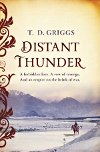 Germany only became a nation in the 1860s, and many Germans had lived inside other people’s borders forever before that. The same applies to Italy. Greece – which had never been a unified country at any time – only became a nation-state in the 1820s. Strictly speaking, the English have never formed an independent nation-state. And while the system of empire certainly led to atrocities, nation-states didn’t do so well in this regard either.
Germany only became a nation in the 1860s, and many Germans had lived inside other people’s borders forever before that. The same applies to Italy. Greece – which had never been a unified country at any time – only became a nation-state in the 1820s. Strictly speaking, the English have never formed an independent nation-state. And while the system of empire certainly led to atrocities, nation-states didn’t do so well in this regard either.
Empires, after all, are by their nature inclusive; nation-states tend to be the opposite. As for the Raj: well, India – the area covered by British India – has never been (and still isn’t) a united state. It was fascinating to me to imagine how the Victorians must have struggled with the concept of self-determination for such a disparate group of peoples. The issue was not clear-cut.
You’ve used a pen name in the past – why is this and why did you decide to publish Distant Thunder under your real name of T.D. Griggs this time?
For my first book, Redemption Blues, I was Tim Griggs. Then I changed publishers, and the new ones (Orion) decided I ought to be re-launched, so they encouraged me to pick a new name as writer of The Warning Bell. But when I presented them with Distant Thunder, it was so different in genre from Warning Bell that they asked if I’d mind changing back – with the proviso that I used initials. ‘Tim’ they said was not an ‘epic’ name!
You’ve an archaelogy masters degree. As Distant Thunder and your last novel, The Warning Bell, are both set in the past, does this mean you painstakingly research your novels?
I do read up quite a bit. I have an interest in history anyway, and especially in the 19th century, which helped with the latest book. Warning Bell – which does refer to the past, although it’s set in the present day – draws a lot on my father’s WW2 experiences, so that was the spur to my research there. Generally I think one should be careful about research: it’s easy to try to force too much of it into a book. I hope I don’t!
I adored your story so far on your website, which tells of your restless search for adventure and demands to be turned into a book of its own. In it you explain how you ended up spending 20 years in Australia – why the pull to Australia and was the country all you imagined it to be?
Australia was very good to me. It gave me a wife, a sun tan, and moderate success in business. I’ve kept the wife. I was drawn by the colour and life of the place, especially after grim 1970s London. I also wanted somewhere it seemed possible to do anything. Australia never disappointed me, and I’m proud to be a citizen.
What was it like returning to Britain, especially after having spent many years trying to escape London’s grey skies?
When I left England, it was ruled by old farts who’d been for through World War 2. They had not adjusted to the country’s decline and were profoundly depressed by it, which depressed everything and everyone else in Britain.
When I came back 25 years later, I was pretty much of an old fart myself – but at least the last lot had been pensioned off. Jenny and I appreciate the depth of culture and the closeness of Europe, and we still get back to Australia every year or two, so we haven’t broken our links.
Your thirst to get your fiction published seems to equal your thirst for adventure. How did you find that first publisher, and do you think it’ll ever get translated?
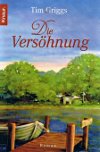 Redemption Blues did OK here though was a near million-seller overseas. The second one, The End of Winter, appeared in six European languages but not English – such are the vagaries of the publishing industry. Don’t look for logic!
Redemption Blues did OK here though was a near million-seller overseas. The second one, The End of Winter, appeared in six European languages but not English – such are the vagaries of the publishing industry. Don’t look for logic!
I found the first publisher because I had a long-standing relationship with an agent (Mark Lucas of LAW) who had maintained faith in me for more than ten years. I suspect that End of Winter will one of these days appear in English, perhaps as an e-book. It deserves it, though I do say so myself.
Finally – we’re hoping our Australian Christmas Party will introduce us to some overlooked Australian Authors. Which authors from that part of the world can you recommend for us?
Well, you’ll be aware of Tim Winton (Cloudstreet, The Riders and Breath) but have a look at David Malouf (The Great World and others). I think he’s deeply under-rated.
Come along to the North London Reading Group’s Aussie Christmas Party on 28 Jan to see T.D. Griggs in action!
 Sadly MH Baylis will now not be able to attend Bookstock on 18 May (we forgive him, he’s been called away to Hungary!) and so William Ryan, author behind the brilliant ‘Korolev’ series of stately-yet-page-turning crime novels atmospherically set in paranoid 1930s Russia, will take his place.
Sadly MH Baylis will now not be able to attend Bookstock on 18 May (we forgive him, he’s been called away to Hungary!) and so William Ryan, author behind the brilliant ‘Korolev’ series of stately-yet-page-turning crime novels atmospherically set in paranoid 1930s Russia, will take his place.